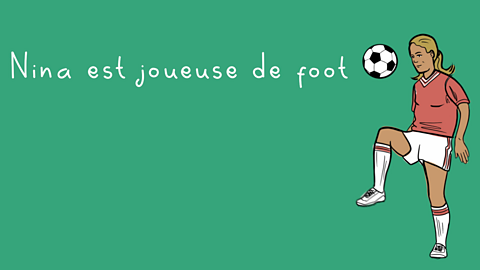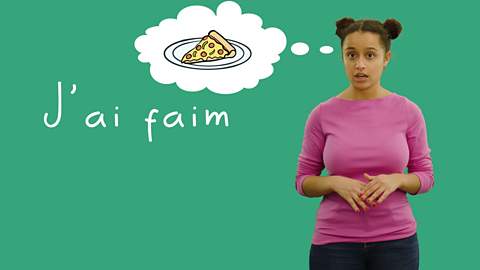Adjectives: How to describe people, places and things in French
You're going to want to describe nouns in French.‚Äé
J'ai un chien - I have a dog is nice but‎… J'ai un chien mignon - I have a cute dog… is better!‎
The first thing to notice is that adjectives in French usually go after the noun.‚Äé
J'ai une porte verte - I have a green door.‚Äé
The next thing to notice is that the adjective must agree with the noun. ‚Äé
Une porte is a feminine noun which means that the adjective vert has a ‚Äéfeminine ending 'e'.‚Äé
If you have more than one of something like deux lapins blancs - two white ‚Äérabbits, lapins is plural. Which means that the adjective has to be plural too. blancs has an s at the end.‚Äé
If you have more than one girl les filles then any adjective has to be feminine ‚Äéand plural.‚Äé
So content adds an e and an s - les filles contentes - the happy girls. Usually adjectives in ‚ÄéFrench come after the noun but there are a few that don't.
beau - beautiful, comes before the noun,‚Äé
bon - good, un bon livre - a good book,
and grand and petit also go before the noun.
Ma petite sœur - My little sister. ‎
Mon grand lit - My big bed.‚Äé
Now where's my cute black dog? **O√π est mon chien mignon et noir?**‚Äé
What is an adjective?
Adjectives are describing words. They tell us more information about nouns, such as the ‚Äécolour, size, age, etc.‚Äé
Examples of adjectives include:
| French | English |
|---|---|
| bleu | blue |
| grand | big |
| petit | small |
| nouveau | new |
| vieux | old |
Where do adjectives go in relation to nouns?‚Äé
In French, adjectives usually go after the noun:‚Äé
- J’ai un chat noir - I have a black cat.‎
- Mon p√®∞˘± a les cheveux courts - My dad has short hair.‚Äé
However, most of the BAGS adjectives go before the noun. BAGS stands for Beauty, Age, ‚ÄéGoodness and Size.
| Beauty | Age | Goodness | Size |
|---|---|---|---|
| beau / belle ‚Äé‚∂ƒé(≤˙±≤π≥Ð≥Ÿæ±¥⁄≥бÙ)‚Äé | vieux / vieille (¥«±ÙªÂ)‚Äé | bon / bonne (good) | grand(e) (≤˙æ±≤µ)‚Äé |
| joli(e) (±Ë∞˘±≥Ÿ≥Ÿ≤‚)‚Äé | nouveau / nouvelle ‚Äé‚∂ƒé(≤‘±∑…)‚Äé | mauvais(e) (≤˙≤πªÂ)‚Äé | petit(e) (small) |
For example:‚Äé
- J’habite dans une grande maison - I live in a big house.‎
- Ma copine a une nouvelle tortue - My friend has a new tortoise.‚Äé
How do adjectives ‘agree’ with the noun?‎
Most adjectives in French change depending on whether they are describing a masculine, ‚Äéfeminine or plural noun. The usual endings are as follows:‚Äé
| masculine singular | masculine plural | feminine singular | feminine plural |
|---|---|---|---|
| (no ending) | ‚Äé-s | -e | -es |
- J’ai un vélo vert - I have a green bike.‎
- Tu aimes les haricots verts? - Do you like green beans?‚Äé
- Ma tante mange une pomme verte - My aunt is eating a green ‚Äéapple.‚Äé
- Mon oncle aime les voitures vertes - My uncle likes green cars.‚Äé
There are some exceptions to this rule, however: ‚Äé
| masculine singular | masculine plural | feminine singular | feminine plural |
|---|---|---|---|
| ‚Äéun jeune ≥Û¥«≥æ≥求Äé ‚Äé(a young man)‚Äé | ‚Äédes jeunes hommes ‚Äé(some young men)‚Äé | ‚Äéune jeune femme ‚Äé(a young woman)‚Äé | des jeunes ¥⁄±≥æ≥æ±≤ı‚Äé ‚Äé(some young ‚Äéwomen)‚Äé |
| ‚Äéun homme heureux ‚Äé(a happy man)‚Äé | des hommes ‚Äéheur*eux * ‚Äé(some happy men)‚Äé | ‚Äéune femme ‚Äéheureuse‚Äé ‚Äé(a happy woman)‚Äé | ‚Äédes femmes ‚Äéheureuses ‚Äé(some happy ‚Äéwomen)‚Äé |
| un homme sporti‚Äéf‚Äé ‚Äé(a sporty man)‚Äé | des hommes ‚Äésporti‚Äéf≤ı ‚Äé(some sporty men)‚Äé | une femme sporti‚Äéve ‚Äé(a sporty woman)‚Äé | des femmes ‚Äésportives ‚Äé(some sporty ‚Äéwomen)‚Äé |
| ‚Äéun homme fier ‚Äé(a proud man)‚Äé | des hommes fi‚Äée∞˘≤ı ‚Äé(some proud men)‚Äé | ‚Äéune femme fi√®∞˘± ‚Äé(a proud woman)‚Äé | ‚Äédes femmes fi√®∞˘±s‚Äé ‚Äé(some proud ‚Äéwomen)‚Äé |
| un gentil ≤µ≤π∞˘√ߥ«≤‘‚Äé ‚Äé(a kind man)‚Äé | des gentils ≤µ≤π∞˘√ߥ«≤‘≤ı‚Äé ‚Äé(some kind men)‚Äé | une gentille ¥⁄±≥æ≥求Äé ‚Äé(a kind woman)‚Äé | des gentilles ‚Äé¥⁄±≥æ≥æ±≤ı‚Äé ‚Äé(some kind women)‚Äé |
Some of the BAGS adjectives are irregular:‚Äé
| English | Masculine ‚Äésingular | Feminine ‚Äésingular | Masculine ‚Äéplural | Feminine plural |
|---|---|---|---|---|
| beautiful | beau, bel | belle | beaux | belles |
| old | vieux, ‚Äévieil | vieille | vieux | vieilles |
| new | nouveau, ‚Äénouvel | nouvelle | nouveaux | nouvelles |
Examples using BAGS
Beautiful
- Le bel homme - The handsome man.‚Äé
- Le beau chien - The beautiful dog.‚Äé
- La belle maison - The beautiful house.‚Äé
Old
- La vieille maison - The old house.‚Äé
- Un vieux vélo - An old bike.‎
New
- La nouvelle maison - The new house.‚Äé
- Un nouveau ‎cinéma - A new cinema.‎
Nouveau, vieux and beau become nouvel, vieil and bel when used to describe a ‎masculine noun that starts with a vowel or an ‘h’: ‎
- Un nouvel ami - A new friend. ‚Äé
- Un vieil homme - An old man‚Äé.
- Un bel appartement - A nice flat.
Quiz
Find out how much you know about adjectives in French in this short quiz.
Game - FestiLingo: French. game
Visit the festival and practise French language skills in this game

More on Grammar
Find out more by working through a topic
- count3 of 7

- count4 of 7
